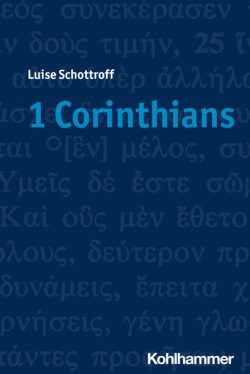Читать книгу 1 Corinthians - Luise Schottroff - Страница 40
На сайте Литреса книга снята с продажи.
3:18–23
Оглавление18 Do not deceive yourselves. Those who think themselves to be wise in this world, in order to be truly wise, should not accommodate themselves to it. 19 The wisdom of this world is actually balderdash before God. It stands in Scripture: »God ensnares the wise in their own cleverness.« 20 And this also stands in Scripture: »The Eternal One knows the plans of the wise and knows how futile they are.« 21 Therefore, no one should put on airs with the people.
You are subject to no one: 22 Whether it be Paul, or Apollos, or Cephas, or the world, or life, or death, or the present, or the future. Everything is yours, 23 but you belong to the Messiah, and the Messiah to God.
Paul summarizes what in the preceding, by a critical analysis of the structures of this world, he has already called by name. People deceive themselves in that they do not want to acknowledge the force of their participation in society. 3:21b–23 are majestically formulated phrases about the holiness of the congregation.
3:18 Self-deception, even for believers in the Messiah, is the way into insidious accommodation to the structures of the world. That leads to complicity that does not recognize its own corruption. A conscious process of change is necessary: away from the wisdom that society values and toward mōria/foolishness, which puts itself publicly on the side of those who are victims of violence (cf. Rom 12:2).
3:19 Paul once again plays with the word mōria: In God’s eyes the »wisdom of the world« is mōria/foolishness—conformist talk that reinforces the structures in control. Paul quotes Scripture on this, first Job 5:12–13, in which the issue for him is especially the panourgia of the wise, their craftiness at the cost of others. In 3:20 Paul continues with another Scripture quote (Ps 94:11), in which he substitutes the word »wise« for the biblical word »humankind« in order to make the reference to the present situation more clear: God sees right through the wisdom of the world.
3:21a names the hubris that accompanies lust for power, as does 1:29 (Jer 9:22 [Eng. Bible, 9:23]).
With 3:21b, triumphal praise for the congregation’s holiness begins. In tone and solemnity, it is comparable to Rom 8:38–39.
»Everything belongs to you,« on the one hand, turns on its head the power structure that has arisen in the congregation (»I belong to the Paul group,« etc., 1:12), and, on the other, relates to the reality of belonging to God (3:23): Those who are set free from all domination belong to God alone.
3:22 The hymn praises a consummation that is anticipated from God’s future and can already be experienced in the present: liberation from oppressive structures in the congregation (3:22a) and in society (3:22b). Society’s tyranny is wielded by powers Paul here calls »world,« »death and life« and »present and future.« The two word pairs are also found in Rom 8:38. Everything is poisoned, even life, for people become slaves to power, and the present is a time of terror.181 God put an end to this reign of terror by raising Jesus from the dead.
3:23 Our slavery is over, we belong to Christ and thus to God. In the final word of this hymn of triumph—God—sound forth both the Shema Israel (see 8:6; cf. Deut 6:4) and the consummation, when all the powers are brought into subjection and »God is all in all« (15:25–28). It is the work of the one God that the healing of the world can already be experienced: in humanity’s communion with the Messiah.
